Microaggressive Comments, Questions, & Beliefs
There are many myths and misconceptions around Trans identities and unfortunately, regardless of whether we believe in them or not, they form transphobic biases in our subconscious and are then translated in the way we speak to and of Trans people. Here are the most common phrases people use that perpetuate transphobic rhetoric.
What Were You Born as? / What's in Your Pants?
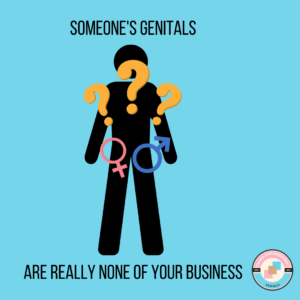
This question is one of the most disrespectful questions cisgender people ask. Asking this question immediately invalidates someone’s gender by suggesting that biological sex is more important than gender identity. The insinuation behind this oftentimes is that we are somehow faking or pretending to be the gender that we are. We are who we say we are, and insinuating otherwise is insulting.
If you ask this question with neutral or good intentions, you may actually be wondering about a person’s gender identity, the gender someone was assigned at birth, or their transition/surgery status. But, quite frankly, in most cases, it’s none of your business. If you want to know if someone is trans or not, wait for them to tell you on their own. Demanding to know such personal information as soon as you meet someone is invasive and inappropriate. You wouldn’t be asking a cisgender person these questions upon meeting, so you shouldn’t be asking a trans person either.
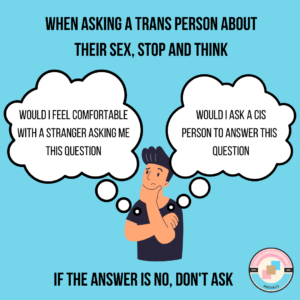
- If you want to know the gender someone was assigned at birth, ask yourself why you feel like you need this information. Will it affect how you treat them? Will it change the way you see them regarding their gender presentation? If you are not their doctor or someone else who actually needs this information to do your job properly, you likely don’t need the answer. Being curious about trans people is natural, but avoid questions that you would not ask a cisgender person.
- If you want to know someone’s transition status, especially whether they have had “the surgery” yet, ask yourself why you care what their genitals look like. Do you care what a cis person’s genitals look like? Probably not. Again, if you are not their doctor, you probably don’t need to be asking this question. You don’t want a stranger to ask about your sex characteristics, don’t ask others about theirs.
- If you are curious about how trans people deal with the incongruence between their bodies and their gender, do research! There are so many resources, on this FAQ page and elsewhere around the internet, that can help answer a lot of these personal questions, and save your local trans a lot of grief. Google is your friend.
Instead of asking about someone’s genitals, ask about their pronouns; this is non-invasive and lets people know that you are accepting of trans identities.
Why Did You Decide to be Trans?
The phrasing of these questions is incredibly disrespectful to trans people. You may just be curious about how trans identities work, but saying that someone “wants” or “chooses” to be trans is offensive. People do not choose to be trans. They do, however, choose to tell people about our identity and pronouns, and hearing these questions often encourages trans people to stay in the closet.
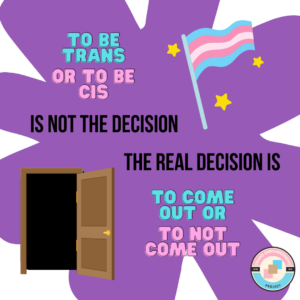
Asking these questions is asking a person to justify or explain an identity that is very personal and often more complicated than cisgender people realize. Trans people often take long periods of time to explore their gender and what labels, pronouns, and language makes them feel most comfortable. To be asked questions like “Why do you want to be trans?” or “Why did you choose to be trans?” suggests that being trans is a phase, trend, or quick decision when it’s not.
- If you want to know the language someone prefers (e.g. pronouns, labels, descriptors), ask directly (e.g. “What pronouns do you use?).
- If you want to know more about how trans identities work in general, research on your own! Explaining how trans-ness works to everyone around us can get exhausting, especially when it is phrased in a disrespectful way.
If you still feel you are justified in asking this question, try turning it around on yourself. Ask yourself, “Why did I choose to be cisgender? When did I decide that I am the gender I identify with?”
When Did You Become Trans?
Similar to asking why someone may “choose” to be trans, it is incredibly disrespectful to use this phrasing. Saying someone “became” or “decided” to be trans suggests that being trans is a choice, which it is not. If you are wondering when someone “decided” to be trans, you probably want to know either when they started to question their gender, when they realized they were trans, or when they came out as trans. All of these questions are valid and okay to ask as long as you have established that this person’s identity is an okay topic!
If you are wondering about how long they have known they were trans, you can totally ask that. It is different for everyone! Some people have known pretty much their whole lives. Some started questioning their gender as a teenager. Some realized in early, mid, or late adulthood. It doesn’t really matter when or at what age, all of these paths are valid.
If you are wondering about how long they have been out of the closet, you can ask this too! Some people have big announcements where they tell everyone they know all at once, and some people come out one person at a time. It really is unique to everyone. As long as you ensure that they are okay talking about it with you and ask in a respectful way at a good time, it is acceptable to ask these questions.
You Sure You're Not a Masc Lesbian (for AFAB Trans) / Fem Gay (for AMAB Trans)?
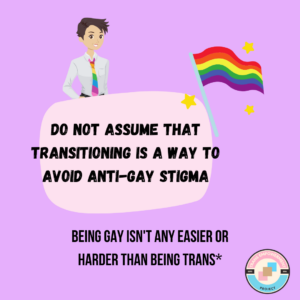
Asking this question invalidates a person’s sexuality and gender identity. You may think it is “easier” or “harder” to be straight but trans instead of cis but gay, but this is inappropriate. People do not choose to have stigmatized identities, they choose to reveal them. Asking this question dismisses all of their self-reflection and assumes they are transitioning to avoid anti-gay stigma.
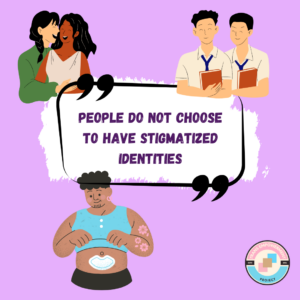
What's Your Real Name?
This question is harmful to trans people in multiple ways.
First, if you meet a trans person who has changed their name, you should never ask for their given name (unless you need it for medical or legal reasons). It is irrelevant to how you refer to them in the present. Ask yourself why you feel the need to know what they were called before they came out.
Second, by using the word “real” instead of “given,” you are arguing that the name a trans person chooses to represent themself is fake or invalid. Their chosen name is their real name.
Third, many cisgender people change their names unquestioned. Spouses will take the last name of their partner. Children will ask teachers and friends to use a nickname. Some adults will completely change their name just because they thought the new name was nice, or that it was funny. All of these name changes are respected without question, so why is it different for trans folks?
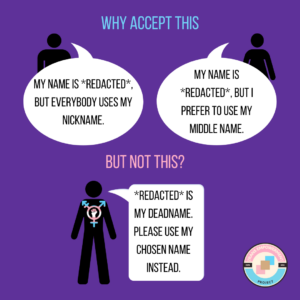

Bottom line: don’t ask this question. Respect their chosen name, and don’t try to figure out what their birth name was.
You'll Always be (Deadname) to Me / Can't I Just Use (Deadname)?
Using someone’s given name after they change it (deadnaming) or using the wrong pronouns (misgendering) is incredibly disrespectful and dysphoria-inducing in almost every context. Unless the trans person has explicitly told you not to use their name and pronouns (whether for safety or privacy), you should use their chosen name and pronouns. Yes, even if you’re friends who have known each other forever and you grew up calling them something different. Yes, even if you’re parents who gave them their birth name. Yes, even if you’re extended family, old friends, new friends, teachers, employers, or whoever. No matter your relation, if someone has come out to you with a new name and/or different pronouns, it is your responsibility to use them. Willingly choosing to use their deadname and misgender them shows incredible ignorance and tells your trans loved one that they will not be listened to nor will they be safe around you.
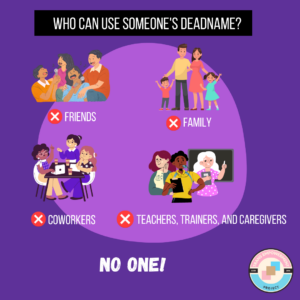
You may have some difficulty updating the language you use for them, but the work is worth it. Before you tell them that “switching to your new name/pronouns is hard for me,” consider how hard it is to tell your loved ones about a personal part of your identity and have it not always be respected. Practice their new name and pronouns, whether it’s by yourself, with another friend or family member, or with a therapist (especially for parents dealing with the “loss” of who they thought their child was). A trans person with support is healthier and happier than one without.
Trans is a Trend / Trans is Trending
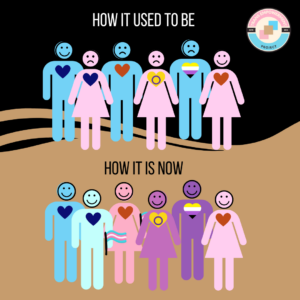
Trans identities have existed as long as humans have. They have existed in every culture, era, and region of the world, albeit in different forms and with different labels. They’ve just gone unrecognized due to the constant erasure of their people, their narratives, and their cultures’ customs.
The reality is, despite Western society’s insistence on the gender binary, Trans people have always existed and will continue to exist until the world’s end. The reason some argue that trans is a trend is that before the internet our voices went mostly unheard. With technology making more information and knowledge available to society, it has become easier for trans people to see themselves reflected in the world and to find community with each other. This access to our culture and community has encouraged many closeted trans people to be open and come out.
It isn’t that more Trans people suddenly exist, it’s that now closeted Trans have access to their language and can now give voice to who they are.
You Can Tell Someone is Trans Based on How They Look/Act
You may think that all trans people have a certain “look,” making it possible to identify who is trans simply by looking, but this is not the case. There are plenty of men who don’t ever reach 5 ft in height, women with strong Adam’s apples, men who don’t grow much body hair, women who gain a lot of muscle mass, etc. Similarly, plenty of men enjoy “feminine” hobbies like make-up or sewing, and plenty of women enjoy “masculine” hobbies like fishing and video games. These “tells” are entirely based on sexist ideas of what a woman or man should look and/or act like, and do not encompass the variety of shapes, sizes, and characteristics we see in both sexes. In this same regard, to tell a trans person that they “don’t look trans” as a compliment is offensive.
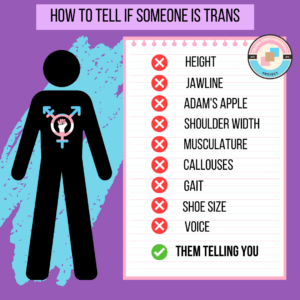
The only way to determine if someone is trans or not is to ask them directly (though it’s often innappropriate, especially in cases where you don’t know each other personally) or wait until they are comfortable enough to tell you.
